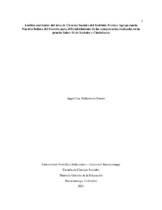| dc.contributor.advisor | Director. Bohórquez Farfán, Ledis | |
| dc.contributor.author | Ballesteros Forero, Ángel José | |
| dc.coverage.spatial | Bucaramanga | spa |
| dc.coverage.temporal | 2021 | |
| dc.date.accessioned | 2021-09-21T20:11:21Z | |
| dc.date.available | 2021-09-21T20:11:21Z | |
| dc.date.issued | 2021-08 | |
| dc.identifier.uri | http://hdl.handle.net/20.500.11912/9204 | |
| dc.description | 138p.: (pdf); il; tablas; gráficas. | spa |
| dc.description.abstract | Esta investigación se desarrolló en el Instituto Técnico Agropecuario Nuestra Señora del Socorro, una institución
educativa rural ubicada en el municipio de Guaca, Santander. La problemática identificada fue el bajo
rendimiento de los estudiantes en las pruebas Saber 11° de Sociales y Ciudadanas durante el periodo 2016 a
2019. Para abordar esta situación se propuso analizar el currículo de Ciencias Sociales de básica secundaria y
media, a partir de los documentos de referencia del Ministerio de Educación Nacional y los resultados de las
pruebas Saber 11°, con el fin de fortalecer en los estudiantes las competencias evaluadas en las pruebas
estandarizadas. Este estudio se abordó desde un enfoque mixto basado en el diseño de triangulación
concurrente, con alcance descriptivo y transversal, usando técnicas como el registro de datos y el análisis
documental. Los principales hallazgos permitieron identificar que tanto los documentos de referencia del
Ministerio de Educación Nacional como las pruebas Saber 11°, tienen como objetivo principal desarrollar y
evaluar las habilidades y conocimientos propios del pensamiento crítico, se identificó la necesidad de construir
planes de área a partir de ejes articuladores, con enfoque problémico, en forma de espiral, con coherencia
horizontal, y a partir de preguntas problematizadoras. Además, se encontró que la prueba Saber 11° de Sociales
y Ciudadanas hace mayor énfasis en las competencias Ciudadanas, con una participación del 60% de la prueba
y en lo referente a las competencias propias del examen, se da mayor relevancia a la interpretación y análisis de
perspectivas. Como conclusiones se propone a la institución alinear el plan de área con los documentos de
referencia, enfatizar en las competencias Ciudadanas y el pensamiento crítico y finalmente explicitar los ámbitos
conceptuales propios de las Ciencias Políticas. | spa |
| dc.description.abstract | This research was developed in the Instituto Técnico Agropecuario Nuestra Señora del Socorro, a rural institution
located in the municipality of Guaca, Santander. The problem identified was the students’ low results on the
SABER 11 tests of Social Science and Citizenship skills during the period of 2016 to 2019. In order to address
this situation, it is proposed to analyze the curriculum of Social Sciences of secondary and middle school taking
into account the guidelines of the Ministry of National Education, the results of the Saber 11 test and the
competencies evaluated in the standardized test of Social Science and Citizenship skills. The research followed a
mixed approach and concurrent triangulation design, through a cross-sectional descriptive study. The information
gathering techniques used were data recordings and documentary analysis. The findings showed that national
guidelines and the Saber 11 tests have the same main objective of developing and evaluating critical thinking
skills, furthermore it is important to build a Social Sciences syllabus based on the articulated axes of the
curriculum, following a problematic approach with a spiral and horizontal coherence and problematizing questions
as proposed by the Ministry of National Education (2002). Additionally, it was found that the Social Science and
Citizenship skills test places greater emphasis on Citizenship skills, with a participation of 60% of the test; and
regarding to the own competencies of the exam, it gives more relevance to the interpretation and analysis of
perspectives. As conclusions, it is proposed to the institution the alignment of the Social Science syllabus to the
guidelines of the government emphasizing the citizenship competencies and critical thinking and finally, it is
necessary to specify the conceptual framework of Political Science. | eng |
| dc.format.mimetype | application/pdf | |
| dc.language.iso | spa | |
| dc.publisher | Universidad Pontificia Bolivariana | spa |
| dc.rights | Attribution-NonCommercial-NoDerivatives 4.0 International | * |
| dc.rights.uri | http://creativecommons.org/licenses/by-nc-nd/4.0/ | * |
| dc.subject | Escuelas - Instituto Técnico Agropecuario Nuestra Señora del Socorro | spa |
| dc.subject | Ciencias sociales | spa |
| dc.subject | Pruebas saber 11 | spa |
| dc.subject | Instituciones públicas - Ministerio de Educación Nacional | spa |
| dc.title | Análisis curricular del área de Ciencias Sociales del Instituto Técnico Agropecuario Nuestra Señora del Socorro para el fortalecimiento de las competencias evaluadas en la prueba Saber 11 de Sociales y Ciudadanas | spa |
| dc.type | Maestría | spa |
| dc.publisher.department | Escuela de Ciencias Sociales | spa |
| dc.publisher.program | Maestría en Gestión en la Educación | spa |
| dc.rights.accessRights | openAccess | spa |
| dc.type.hasVersion | publishedVersion | spa |
| dc.description.sectional | Bucaramanga | spa |
| dc.identifier.instname | instname:Universidad Pontificia Bolivariana | spa |
| dc.identifier.reponame | reponame:Repositorio Institucional de la Universidad Pontificia Bolivariana | spa |
| dc.identifier.repourl | repourl:https://repository.unab.edu.co/ | |
| dc.description.degreename | Magíster en Gestión en la Educación | spa |


